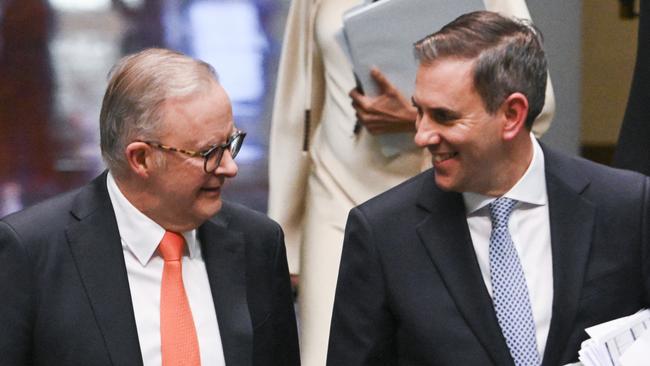Budget 2024: Labor ‘fails own test’ on national interest funding
Industry leaders and economists say a new ‘national interest’ test must be applied retrospectively to contentious $1bn investments in Australian-made solar panels and a world first quantum computer

Former productivity tsar Gary Banks says contentious $1bn investments in a world-first quantum computer and Australian-made solar panels would not have cleared a new “national interest framework” proposed by Labor to ensure taxpayers’ money is not wasted under the Future Made in Australia agenda.
The warning from Professor Banks came as Labor’s $13.7bn plan to roll out production tax credits for green hydrogen and critical minerals, both of which will require legislation, was met with fierce criticism from the Coalition and the Greens.
Anthony Albanese hit back at opponents of his Made in Australia agenda, saying they were “all negativity and no plan” and arguing Labor was setting up the country for long-term success.
“We need to attract more investment in home-grown industries so we can make more things here,” the Prime Minister writes in The Australian. “Encouraging investment in areas like critical minerals and green hydrogen will help make Australia an indispensable part of the net-zero economy of the future.”
But industry leaders turned up the heat on Wednesday over the timing of Labor new national interest framework, which will be legislated later this year as the centrepiece of the government’s Future Made in Australia Act.
Australian Industry Group chief executive Innes Willox said it was important the same standards were applied to all investments announced under Labor’s Future Made in Australia plan, including those unveiled in the lead-up to the budget.
This meant retrospectively applying the framework to the $1bn for US-based tech company PsiQuantum to build a fault-tolerant quantum computer in Brisbane and the $1bn for the Solar Sunshot program to make more solar panels in the Hunter Region.
“Given the government has established criteria around future funding, it is of course appropriate that investments already made are tested through the same criteria,” Mr Willox said. “There must be the same rule for past, present and future investments.”
Professor Banks, the inaugural Productivity Commission chair, said neither the $1bn investments for PsiQuantum or the Solar Sunshot program would “satisfy the national interest criteria”.
“It’s obviously better to have some such criteria … Of course, that assumes the criteria would actually be applied as intended, which from experience is by no means a given,” he said. “No doubt, with enough bureaucratic ingenuity, a way could be found to get them over the line.”
Business Council of Australia chief executive Bran Black also questioned the process for investments made so far under the Future Made in Australia agenda.
“We don’t know what the framework was,” Mr Black said. “Now, that’s not to say that there was a framework or that there wasn’t. And that’s something that we need to look at very closely. Because, as with any investment with taxpayer funds, you want to have that confidence that it’s being applied in the right way.”
Less than 24 hours after Dr Chalmers revealed the government was committing $13.7bn to deliver production tax credits for green hydrogen and critical minerals from 2027-28, opposition Treasury spokesman Angus Taylor rejected the plan as delivering “billions for billionaires.”
“This is the most competitive sector, one of the strongest sectors in Australia. To say the only way it’s going to survive is government subsidies – you know that is an extraordinary claim to make,” he told the ABC.
He also questioned why the government had not rolled out its national-interest framework in advance of the major investments announced under the Future Made in Australia agenda.
“We will go through the detail,” Mr Taylor said. “But what’s very clear about Made in Australia is that the government has put the cart before the horse. It has made significant announcement before working out how it will impact taxpayers.”
A 34-page Treasury “supporting paper” released on Tuesday made clear the Future Made in Australia Act would include a new “national interest framework that clearly articulates how priority sectors will be identified”. “The framework will be used to impose rigour on government’s decision-making on significant public investments, particularly those used to incentivise private investment at scale,” the paper said.
The framework sets out five key tests for public investment, including “Australia’s grounds for lasting competitiveness, the role the industry will play in securing an orderly path to net zero, the role the industry will play in building Australia’s economic resilience and security, whether the industry will build key capabilities, and whether the barriers to private investment can be resolved through public investment in a way that delivers compelling public value.”
Greens leader Adam Bandt said he would look at the legislation for the green hydrogen and critical minerals tax credits, but warned there would be no free pass for Labor. He branded the government “climate frauds” and said Labor’s commitment to gas beyond 2050 had placed its legislative agenda at risk.
“We will have a look at measures Labor puts to parliament. But we will look at it as a package,” he said.




To join the conversation, please log in. Don't have an account? Register
Join the conversation, you are commenting as Logout